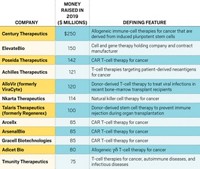Advertisement
Grab your lab coat. Let's get started
Welcome!
Welcome!
Create an account below to get 6 C&EN articles per month, receive newsletters and more - all free.
It seems this is your first time logging in online. Please enter the following information to continue.
As an ACS member you automatically get access to this site. All we need is few more details to create your reading experience.
Not you? Sign in with a different account.
Not you? Sign in with a different account.
ERROR 1
ERROR 1
ERROR 2
ERROR 2
ERROR 2
ERROR 2
ERROR 2
Password and Confirm password must match.
If you have an ACS member number, please enter it here so we can link this account to your membership. (optional)
ERROR 2
ACS values your privacy. By submitting your information, you are gaining access to C&EN and subscribing to our weekly newsletter. We use the information you provide to make your reading experience better, and we will never sell your data to third party members.
Start-ups
Century Therapeutics launches to develop stem cell-derived, gene-edited cell therapies for cancer
The start-up has raised $250 million, the majority of which came from Bayer, to make off-the-shelf cell therapies from induced pluripotent stem cells
by Ryan Cross
July 2, 2019
| A version of this story appeared in
Volume 97, Issue 27

Century Therapeutics is the latest start-up to launch with plans to develop off-the-shelf cancer cell therapies, and it has gene editing tools, stem cell technology, and $250 million in financing to do it.
The venture capital firm Versant Ventures founded Century in 2018 after watching two cancer cell therapies get approved the year before. Those CAR-T therapies, Kymriah and Yescarta, require taking patients’ immune cells from their bodies, genetically engineering them in the lab, and reinjecting them to fight cancer. They work, but they have three clear limitations, according to Tom Woiwode, a Versant managing director.
First is high cost, born of customization, Woiwode says. “Second, they take weeks to produce, so patients with urgent needs are not getting them.” And finally, the two approved therapies only work for certain blood cancers. Solid tumors have been harder to treat with cell therapies.
To make a better cell therapy, Versant turned to induced pluripotent stem cell (iPSC) technology. iPSCs are adult stem cells that can be coaxed to transform into just about any other kind of cell. Scientists can genetically engineer iPSCs to fight cancer and carefully examine the changes for accuracy. The edited stem cells can then be turned into immune cells—such as T cells, natural killer cells, or macrophages—ready for deployment at a moment’s notice.
Bayer’s venture arm liked the idea. In 2016, Bayer and Versant had worked together to launch a regenerative medicine iPSC company called BlueRock Therapeutics with $225 million. For Century, Bayer committed $215 million and Versant recruited Fujifilm Cellular Dynamics, which specializes in iPSC development, as an additional investor and manufacturing partner.
“This modality is more capital intensive than your traditional small molecule,” says Century CEO Lalo Flores. “And of course, manufacturing requires investment up front.”
Century isn’t the only firm pursuing the off-the-shelf approach, which is also called allogeneic cell therapy. Fate Therapeutics is also working with iPSCs to make natural killer cell therapies for cancer. Other companies, such as Allogene and Cellectis, are developing a different kind of allogeneic cell therapy in which T cells are sourced from healthy donors.
Even though Century’s ultimate goal is to tackle solid tumors, it will first test its technology in blood cancers. “We think we can be competitive in that space, and it will also provide a springboard towards solid tumors,” says Hy Levitsky, Century’s president of R&D.



Join the conversation
Contact the reporter
Submit a Letter to the Editor for publication
Engage with us on Twitter